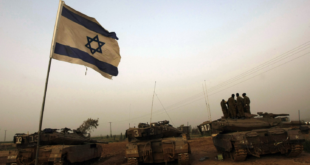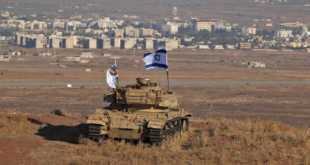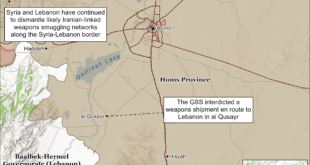A Pentagon report that the Islamic State terror group is making a resurgence in both Syria and Iraq is causing bit of a stir in the region, where most governments would like to see a definitive end to its saga.
Arab media gave wide coverage to the U.S. Defense Department report that the Islamic State group is making a comeback in both Iraq and Syria, amid widespread contempt for the organization. Most people in the region would like to see a quick end to IS, which has caused death and destruction in a number of countries, including Syria and Iraq.
Islamic State’s alleged leader, Abu Bakr al-Baghdadi, purportedly appeared in a video in April, claiming that the group would exact revenge for the loss of its so-called “caliphate.” U.S.-backed Kurdish militia fighters captured the group’s last physical stronghold in the town of Baghuz, in eastern Syria, several months ago, but scattered reports of sleeper cell attacks in parts of Iraq and Syria persist.
Reports about Baghdadi’s whereabouts in recent years have placed him variously in Mosul, Iraq along the Iraqi-Syrian border, and in Raqqa, Syria. Arab media have reported that he was wounded or near death on several occasions. Yet, the man in the video appears to have no battle scars and no obvious traces of hardship.
Iraqi Prime Minister Adel Abdul Mahdi said recently that Baghdad would continue to battle Islamic State with cooperation from its international partners and allies and that many sleeper cells continue to exist.
He says Iraq is cooperating with countries across the world to fight Da’esh, because any slack will cause cracks in the alliance against the group. He stresses that Iraq is working both domestically and with other countries to catch IS sleeper cells and shut them down. He argues that Da’esh is trying to regain its former status and that it no doubt still has many sleeper cells.
The term Da’esh is an Arab acronym for Islamic State.
Joshua Landis, who heads the Department of International and Area Studies at the University of Oklahoma, says Islamic State “remains a problem, despite the destruction of its caliphate.” He says that the group’s ideology remains strong among “the women and family members of IS fighters that have been placed in the al Hol camp,” and that many IS fighters “continue to carry out guerrilla attacks.” Al Hol is a Kurdish-run camp for those displaced from former Islamic State-controlled areas, including wives and children of former fighters.
Syria’s ambassador to the U.N., Bashar al-Jaafari, claimed during a recent Syrian dialogue session in the Kazakh capital, Astana, that he thinks that many foreign governments are supporting IS, in order to keep Syria in a perpetual state of chaos.
He says that there is no reason for anyone to doubt that there is foreign support for terrorism in Syria, be it Israeli, American, British, Turkish or French. He adds that people in the West are beginning to acknowledge this, but that many continue to obscure its real nature and rejigger it from time to time to give a false picture of what is going on.
No matter who is behind Islamic State and other terror groups in the area, though, Egyptian President Abdel-Fattah el-Sissi says Arab states must combat the Islamic State ideology and defeat it.
He says that all forms of terrorism and its ideology of hatred and discrimination remain at the forefront of threats facing the Arab and Islamic worlds, not to mention the world as a whole. Egypt has been trying to stamp out this ideology for many years.
Destroying Islamic State’s ideology is not an easy task, however. Theodore Karasik of Gulf State Analytics says that “the indoctrination process has many vectors that help keep fighters sustained for another day of fighting.” He says that terrorists need to be dealt with “in a proactive way.
“Their support networks are internal,” he says, “and we need to remember that Islamic State is the richest terrorist group ever, with hundreds of millions of dollars.”
 Eurasia Press & News
Eurasia Press & News



